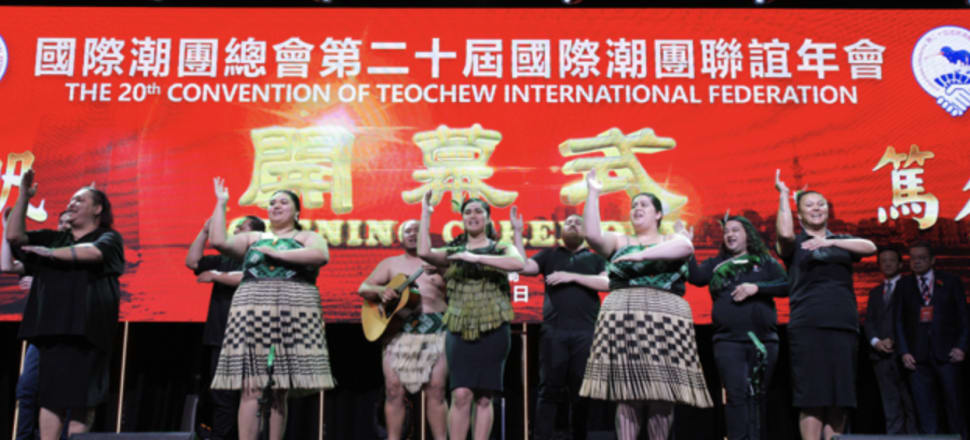
Finally, the defence opens in the case of seven people charged with crimes over political party donations - and it starts with a word by word challenge to Chinese translations relied on by the Crown.
The Crown used two translators to establish what suspects in its investigation into undeclared donations to Labour and National were saying in their private WeChat audio messages.
One was expert in Mandarin, the other specialised in the southern Chinese Teochew dialect, which is the mother tongue of some of the defendants in the High Court trial.
The translators would listen to messages obtained by the Serious Fraud Office, transcribe them into the Chinese characters, give a literal English translation and then a more accurate spoken version for an English audience.
But the translations of particular words and phrases, the co-location of words, context, grammar and semantics are all viewed by at least one of the defendants as having missed the real meaning and nuance of what was discussed, and having set the prosecution on the wrong path.
The first defence witness before Justice Ian Gault at the start of the sixth week of the trial was an Australian-based Chinese linguistics expert Dr Huiling Xu, of the University of Newcastle, who was called by Yikun Zhang, the Teochew-speaking Auckland businessman at the centre of the SFO prosecution.
Zhang's lawyer, John Katz QC, said his client would not give evidence for himself and had just the one witness.
Dr Xu is proficient in Mandarin, Cantonese and Teochew, and her doctoral thesis is a seminal work on the Teochew dialect - something 'synchronic' and much more than a dictionary, she told the court.
Chinese languages all use the same written characters, but the words can be quite different when spoken. To achieve clear meaning, and for faster understanding, many Chinese people prefer audio messaging rather than written text messaging to communicate with friends and associates.
Dr Xu said even in spoken Chinese languages there was widespread use of homonyms, or words pronounced the same but with different meanings.
Lawyer Lauren Lindsay, for Yikun Zhang, took her through a series of translated phrases taken from WeChat audio messages that the Crown had relied on in building its case against Zhang and his business associate Colin Zheng and at least two others, whose names are suppressed.
Dr Xu pointed out that where one Crown translator had written that a discussion was about an 'association uniform', that should more correctly be a reference to a 'banner' at an event.
She challenged the Crown translator's interpretation of the verb to 'do' as to 'run' in a chat about art and an auction, which the Crown said showed defendants knowingly arranging a sham silent auction to cover a donation of a net $35,000 to Labour.
And in a series of other disputes over translation, said what Xu regarded as words meaning dividing money into 'batches' had been misheard or misunderstood as dividing among several 'people'.
A translation of a defendant saying something could be sorted 'in due course' was more likely just a common Chinese way of saying 'then, then, then' meaning 'all right, you will do it later'.
Dr Xu said the Crown translator had recorded the word 'spreadsheet' from a chat about donor identities when she believed it was more appropriately the word 'list' - saying a table or spreadsheet was not the correct way to express a number of names.
And she said where a Crown translator had reported a defendant mentioning that one person was 'too honest' to participate in buying artworks, the words concerned more properly meant the person was 'straightforward.'
"I think it really means straightforward," she told Lindsay.
In yet another disputed translation of wording from a conversation, Dr Xu said a common Chinese phrase of 'you might like to keep a few for yourself' in relation to the discussion on art works had been left out, even though the words were obvious in the Chinese characters transcribed from the audio message
The disputes over the meanings in English of some of the conversations between defendants saw Dr Xu travel from Australia to provide her expert view.
But when Lindsay sought to introduce Xu's full report, appendices and a range on translations as exhibits, Crown lawyer John Dixon QC objected, saying some of the material had not been put to the two Crown translators in cross examination earlier in the trial.
Lindsay told Justice Gault the full Xu report and translations had been available to the Crown to put to its witnesses since before trial started in July and it had failed to do so
She said Yikun Zhang had taken issue with the Crown's translations - and the meanings the prosecution had chosen to take from them - "from a very early stage. It was very clear the Crown's translations would be opposed."
Defence lawyers had raised the fact the judge might yet consider ruling the Crown translations inadmissible because of a lack of independence, in one case the SFO using a person who had been too familiar with the case and interviews, or for lack of accuracy.
Justice Gault told Dixon that if that possibility eventuated and the Crown's translations were ruled out, and if Dixon's bid to have Dr Xu's translations inadmissible succeeded, there would be no translations remaining in evidence. It was agreed that some of Dr Xu's versions could be used if the Crown's attempts had to be ruled out.
The Crown has charged Zhang, Colin Zheng, his twin brother Joe, and three others whose names remain suppressed, with obtaining by deception over the $35,000 art auction donation to Labour in 2017, and Zhang, the two Zhengs, and former MP Jami-Lee Ross over two separate $100,000 donations to National in 2017 and 2018. All seven have pleaded not guilty.







